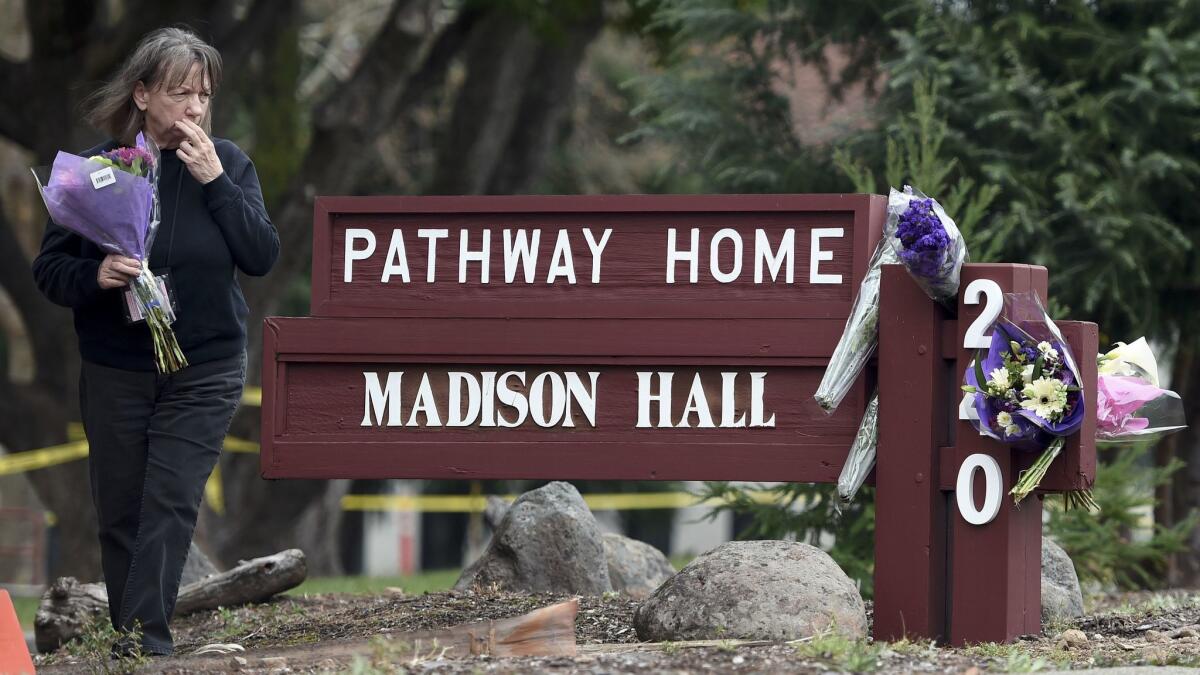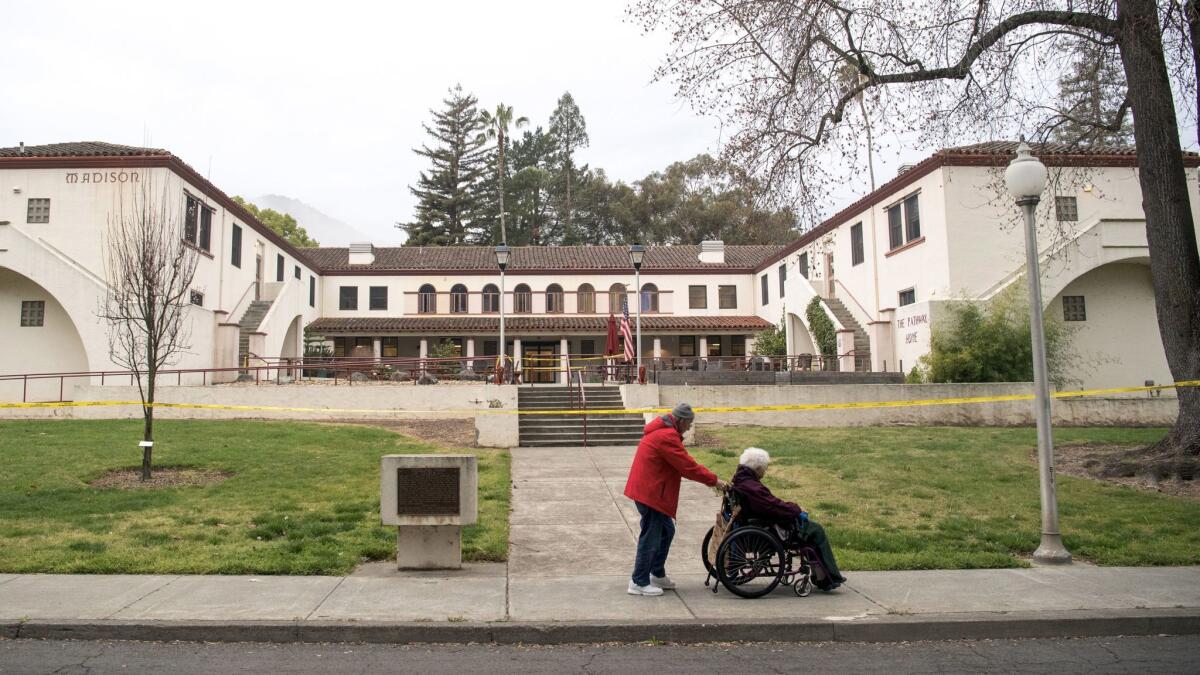Witness recounts harrowing entry of Yountville gunman as residents and townspeople mourn

- Share via
Reporting from YOUNTVILLE, Calif. — Haley Rekdahl was attending a going-away party for two colleagues at a veterans care home Friday when a gunman walked in the door, ammunition hanging from his neck and a gun in his hands.
She knew him: Albert Wong, 36, a troubled veteran who had been in treatment at the Pathway Home for post-traumatic stress disorder and who had been ousted a month earlier because of hostile behavior.
“We all kind of got as far away from him as possible,” recalled Rekdahl, a residential counselor, as she stood Sunday outside the home. “We just hid behind furniture.”
Wong told the other veterans in the building that they could leave. Then he called out names of staff members who he said also were free to go. Rekdahl was among them.
He said three women had to stay: Jennifer Golick, 42, the clinical director; Christine Loeber, 48, the center’s executive director; and Jennifer Gonzales, 32, an expert in PTSD who was six months pregnant.
Wong later killed the three women in a second-floor room before taking his own life, according to authorities. He was found dead next to their bodies Friday afternoon. All had sustained gunshot wounds. Officials have said Wong, of Sacramento, suffered from PTSD, but they have not identified a motive for the attack.
Two days after the shooting, Rekdahl provided one of the first accounts of what occurred inside the veterans home just before the killings, as other residents of the complex and townspeople tried to come to grips with the carnage.
Though Rekdahl knew the veterans being treated for combat-related conditions were suffering, she said, she never imagined “in a thousand years” that one would attack the staff.
“We are just all in shock,” she said, looking pale and shaky.
She said she thought she was going to die on Friday. She knew why Wong targeted the three women he killed, she said, but she declined to reveal more.
Rekdahl spoke as she helped clients in the residential care program pack their belongings Sunday. They have been moved to other quarters.
The Pathway Home is on the grounds of the Veterans Home of California, founded in 1884 and now the largest residential setting for vets in the nation.
The complex is nestled on hundreds of acres of rolling land dotted with redwoods and oaks and bordered by tree-covered hills, vineyards and a golf course in this wine country community.
Cream-colored stucco buildings with pane windows and Spanish tile roofs bear the names of former presidents. About 1,000 veterans live here, and most are elderly.
They roam the grounds on motorized scooters, with orange, triangular flags mounted on poles.
The Pathway Home, a nonprofit program started in 2008, shares the campus, serving veterans of post-9/11 wars suffering from combat-related illnesses.
The elder vets said Sunday that the younger men generally stuck together, eating at one table in the back of the mess hall and walking with therapy dogs.
Al Selness, 83, a retired life insurance agent who fought in the Korean War, stopped by the Pathway Home on Sunday just to stare at the building. It was surrounded by yellow police tape fluttering in the wind.
A resident of the veterans’ complex for 18 years, Selness knew the victims.

“I used to see those ladies all the time,” he said. Gonzales, “the young one, always had a smile for me.”
Selness was walking to the dining hall Friday when he heard four rifle shots. He said he saw two police cruisers pull up behind the building and officers run out.
“So sad,” he said. “Young women.”
The complex is only a short distance from downtown Yountville, a bustling community of upscale eateries, tourists and wine tasting rooms. Restaurants bear their chefs’ names.
“Modern burger joint and ice cream lab,” reads a sign over the door of one eatery.
Those who own and work in the businesses there say they know many vets by name.
Grant Yeargain, 30, who serves wine in one of the tasting rooms, said he always offers one of the elder vets a free “splash” when he comes in.
Napa Valley embraces its veteran community, Yeargain said. Parking spaces reserved for veterans abut those for the disabled, he said.
Scott Lewis, 46, a partner with V Wine Cellar, said the merchants have raised money for the Pathway Home and know many of the vets and the staff.
“There’s a lot of grief this week,” Lewis said. “The vets are part of this community. We love them.”
Some townspeople joined the vets at the Veterans Home Memorial Chapel on Sunday to express their support.
Col. Robert Krieger, the chaplain, exhorted the gathering to pray for the victims’ families and for one another.
“Grief shared is grief diminished,” he said, standing in front of an altar bordered by stained-glass panels etched with the words “Remember All Veterans.”
None of the elder vets or the townspeople interviewed Sunday expressed hostility toward the gunman. They viewed him as broken.
Combat must have “really flipped him 360 degrees,” said Michael Mackay, 65, a resident veteran.
“A lot of folks forget he was a veteran just like them,” said a staff member of the Pathway Home, who declined to give his name.
Matthew Decker, 34, a veteran of the Iraq war sent by the Department of Veterans Affairs to Yountville to do grief counseling, said he had just spoken to a resident for an hour and half.
“You are allowed to be scared. You are allowed to be angry,” Decker, a licensed social worker, told the man. He said residents felt their home had been violated.
Many Napa County residents drove to the complex over the weekend to leave flowers and light candles at a Pathway Home sign.
“It just makes you realize it can happen to anyone anywhere,” said Astrid Bock, 47, dropping off a bouquet. “Someone can just walk in with a gun.”
Twitter: @mauradolan
More to Read
Sign up for Essential California
The most important California stories and recommendations in your inbox every morning.
You may occasionally receive promotional content from the Los Angeles Times.














